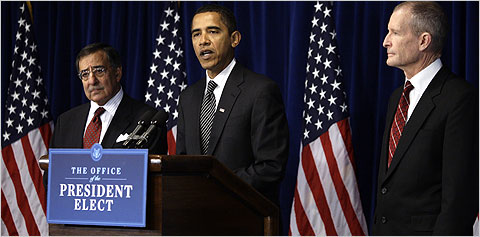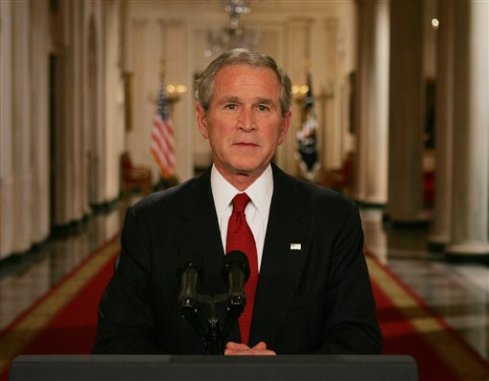You are currently browsing the tag archive for the ‘Bush administration’ tag.

Famous for being famous! This election was amazing in that the things which were first said to hurt Obama – came back in the end to help defeat McCain – for example, Obama’s ability to attract large crowds – would go on to mean he would attract 200,000 plus in Germany – but rather than admit this was a great accomplishment (given Germany’s history) – Republicans chose to deride it – saying that Barack Obama was merely a celebrity – not to be taken seriously. Enter Sarah Palin, who for some really is a celebrity – who literally doesn’t know enough – to put together a concise argument on any number of critical issues – important to those seeking the highest office. Without substance Sarah Palin becomes famous for being famous – a celeb politician – who ‘ain’t in it for naught’.
She failed to save John McCain from presidential election doom, but Sarah Palin, the Republican senator’s controversial running mate, may yet emerge as the saviour of the American publishing industry. Literary agents are queueing up to sign her to a book deal that could earn her up to $7m.
With Barack Obama’s election victory certain to generate dozens of volumes from politicians, strategists and journalists – and with another shelfload of memoirs expected from members of President George W Bush’s administration – Palin’s personal account of her tumultuous introduction to national politics is widely regarded as the book most likely to repay a multi-million-dollar advance.
“She’s poised to make a ton of money,” said Howard Rubenstein, New York’s best-known public relations adviser.
“Every publisher and a lot of literary agents have been going after her,” added Jeff Klein of Folio Literary management.
Palin’s profile showed no sign of diminishing last week, despite McCain’s defeat and embittered Republicans seeking a scapegoat for the party’s collapse.
She now finds herself in a position similar to Obama’s in 2004, when the then mostly unknown Chicago politician delivered a mesmerising speech to the Democratic convention, was elected to the Senate and swiftly wrote a bestselling book – The Audacity of Hope. This proved to be the springboard for his presidential launch.
Like Obama, Palin has come from nowhere – in her case, Wasilla, Alaska. She is considered a likely candidate to move to Washington as Alaska’s senator if one of the state’s two seats falls vacant next year. Her book may reach a vast audience fascinated by her journey from the moose-hunting wastes of the Alaskan tundra to a historic battle for the White House.
Undaunted by her poll defeat, Palin was in fighting form last week, inviting cameras into her home, serving visiting interviewers home-cooked moose chilli and haddock and salmon casserole.
She scoffed at untrue reports that she initially thought Africa was a country and that she didn’t know members of the North American Free Trade Agreement. She said much of the criticism levelled at her came from “bloggers in their parents’ basements just talking garbage”.
At a sombre meeting of Republican governors later in the week, Palin’s megawatt celebrity far outshone her more experienced colleagues. Frank Luntz, a prominent Republican consultant, called her a “rock star”, but Tim Pawlenty, the governor of Minnesota, warned that she would be only “one of the voices” leading the party forward.
Yet there are already signs that conservative Republicans, thrilled by Palin’s right-wing views, are manoeuvring to keep her in the public eye with a view to the 2012 elections and beyond. One group, called Our Country Deserves Better, last week collected tens of thousands of dollars to pay for television advertisements to run over the forthcoming Thanksgiving holiday. The adverts are to thank Palin for her efforts.
Despite polling evidence that Palin failed to make much impact on any of the groups that McCain strategists hoped she might deliver – women, independent voters and suburbanites – her supporters insisted that she should not be blamed for either McCain’s shortcomings or the legacy of the Bush administration’s failures. Palin herself noted that in view of the Bush record, “it’s amazing we did as well as we did”.
Although anonymous McCain aides had variously described her as a “diva” and a “whack job” and Maureen Dowd of The New York Times derided her last week as “Eliza Know-little”, she has earned plaudits from a surprising range of friends and former foes for keeping her cool under fire.
Camille Paglia, the radical feminist, declared that she had “heartily enjoyed [Palin’s] arrival on the national stage”. She had been subjected to “an atrocious and sometimes delusional level of defamation”, Paglia added. “I can see how smart she is and, quite frankly, I think the people who don’t see it are the stupid ones.”
Joanne Bamberger, the liberal author of the popular PunditMom blog, praised Palin for not “fading into the Alaskan woodwork”, and added: “She’s got some serious chutzpah . . . Palin has taken charge of this moment . . . and she’s making the most of the notoriety that was offered her”.
With publishers as nervous as everyone else about next year’s economic prospects, Palin’s popularity has become a boon. “Nobody is waiting for George W Bush’s memoirs,” one New York agent noted.

NEW YORK – Wall Street suffered through another traumatic session Monday, with the Dow Jones industrials plunging as much as 800 points and setting a new record for a one-day point drop as investors despaired that the credit crisis would take a heavy toll around the world. The Dow also fell below 10,000 for the first time since 2004, and all the major indexes fell about 5 percent.
The catalyst for the selling was the growing realization that the Bush administration’s $700 billion rescue plan and steps taken by other governments won’t work quickly to unfreeze the credit markets. Moreover, investors are increasingly unnerved by the paralysis in the credit markets that has started to affect companies trying to borrow for acquisitions or just to conduct their daily operations.
That sent stocks spiraling downward in the U.S., Europe and Asia, and drove investors to sink money into the relative safety of U.S. government debt. Fears about a global recession also caused oil to drop below $90 a barrel.
“The fact is, people are scared and the only thing they’re doing is selling,” said Ryan Detrick, senior technical strategist at Schaeffer’s Investment Research. “Investors are cleaning out portfolios and getting rid of everything because nothing seems to be working.”
The selling was so extreme that only 107 stocks rose on the NYSE — and 3,121 dropped. That’s a telling sign considering the stock market is considered a leading economic indicator, with investors tending to buy and sell based on where they believe the economy will be in six to nine months.






 Newly obtained computer schematics provide further detail of how electronic voting data was routed during the 2004 election from Ohio’s Secretary of State’s office through a partisan Tennessee web hosting company.
Newly obtained computer schematics provide further detail of how electronic voting data was routed during the 2004 election from Ohio’s Secretary of State’s office through a partisan Tennessee web hosting company.

Recent Comments